Jonathan Posner's Blog
September 21, 2025
The Thursday Book Club – Sept 25

The latest edition of The Thursday Book Club was broadcast on 18th September 2025 at 2pm on Phonic FM. Joining host Cathy Dodd were Alison Huntingford and Jason Mann. Click the names to find out more about them, and use the audio bar below to listen to the full show.
 We reviewed The Bonfire of the Vanities by Tom Wolfe.
We reviewed The Bonfire of the Vanities by Tom Wolfe.
Available on Amazon.
Our discussion was a revisit to a perennial topic – Are you a plotter or a pantser?
The second hour featured a discussion on: What makes a literature festival a success?
Cathy also played some great music!
Listen to the show in full here:
https://jonathanposnerauthor.com/wp-content/uploads/2025/09/TBC-Show-25-18-09-25.mp3The next show is at 2pm on the 16th October 2025.
NEWS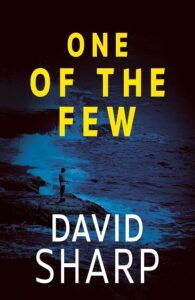 David Sharp’s new book, One of the Few, is set in idyllic Jersey. This captivating novel proves murder can occur in the most picturesque of places, committed by those least likely. Here’s the blurb: With another mysterious cold case on their radar, DI David Lancaster and DS Marie Viday travel to the island of Jersey in the English Channel, to investigate the death of Peter Urbawicz, a retired World War II spitfire pilot, whose death twenty years prior was recorded by the island police as ‘accidental’.
David Sharp’s new book, One of the Few, is set in idyllic Jersey. This captivating novel proves murder can occur in the most picturesque of places, committed by those least likely. Here’s the blurb: With another mysterious cold case on their radar, DI David Lancaster and DS Marie Viday travel to the island of Jersey in the English Channel, to investigate the death of Peter Urbawicz, a retired World War II spitfire pilot, whose death twenty years prior was recorded by the island police as ‘accidental’.
With his daughter, Lady Stottard, adamant that her father died in suspicious circumstances, can these two detectives investigate without ruffling any feathers? Can they pick apart the facts and route out the clues to prove his death was not an accident, when said facts and clues have lain buried for twenty years?
When their enquiries trigger a visit from British Counter Terrorism operatives, the case becomes even more complicated, and they are left wondering how an IRA terrorist, a French boatyard owner, and an ex-East German STASI officer fit into their case.
David will be doing a Meet the Author talk on Thursday October 2nd at the Ivybridge Bookshop.
Publication date is 30th September. Pre-Order on Amazon.
 Kathy Morgan’s book Death on the Village Green is published in paperback and e-book tomorrow, Friday 19th September, and is available on Amazon. The second in the Yvonne Parker Mystery series, the audiobook will be available on Audible soon too.
Kathy Morgan’s book Death on the Village Green is published in paperback and e-book tomorrow, Friday 19th September, and is available on Amazon. The second in the Yvonne Parker Mystery series, the audiobook will be available on Audible soon too.
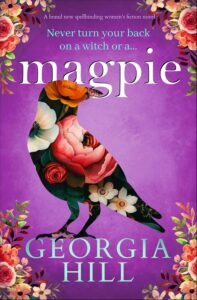
Georgia Hill’s new book, Magpie, came out this week, inspired by the Bideford Witches. This is a dual timeline novel, set in both the 1660s and contemporary Devon. A twisty tale of secrets and witchcraft, it’s perfect for fans of Weyward!. Here’s the blurb:
When Beth Loveday retreats to a shadowed corner of the Devon coast, she hopes to rebuild her life in peace. But the old timbered shop she buys—Tenpenny House—has other plans. Strange objects are hidden in the walls. There’s a book of forgotten remedies. And dreams that feel like memories.
In 1660, Susanna Loveday walks the same worn floors. Apprentice to a healer, she’s swept into a deadly game of suspicion and power when whispers of witchcraft begin to spread. As danger closes in, a single choice will echo through time.
Linked by blood and bound by secrets, Beth and Susanna are caught in a web that spans centuries. The truth lies buried—but Tenpenny House remembers everything… Available on Amazon.
 Emily Higgins is pleased to announce that she is now 36,000 words into her debut novel. She’s longed to write a book for a while and finally stopped procrastinating long enough to start! She’s just had feedback for her first chapter from her lovely BETA readers and it’s been invaluable. If anyone wants to keep up to date with her writing journey, she’s keen for you to follow her on Facebook. She says she also updates her website regularly.
Emily Higgins is pleased to announce that she is now 36,000 words into her debut novel. She’s longed to write a book for a while and finally stopped procrastinating long enough to start! She’s just had feedback for her first chapter from her lovely BETA readers and it’s been invaluable. If anyone wants to keep up to date with her writing journey, she’s keen for you to follow her on Facebook. She says she also updates her website regularly.
We at The Thursday Book Club wish Emily all the best with her writing and look forward to hearing more about her book in future.
 Peter Hall’s latest novel The Accidental Realmshifter was published on Amazon on 27th August. It’s available on Amazon in eBook, paperback, hardcover and audiobook (in the US). It’s a complex time-travel thriller set in Barnstaple, and follows an autistic computer programmer on an emotional and spiritual journey to save humanity from slavery under a future AI dictator. The logline is: “The Accidental Realmshifter—where Quantum Leap meets Doctor Strange, and neurodiversity becomes a superpower.”
Peter Hall’s latest novel The Accidental Realmshifter was published on Amazon on 27th August. It’s available on Amazon in eBook, paperback, hardcover and audiobook (in the US). It’s a complex time-travel thriller set in Barnstaple, and follows an autistic computer programmer on an emotional and spiritual journey to save humanity from slavery under a future AI dictator. The logline is: “The Accidental Realmshifter—where Quantum Leap meets Doctor Strange, and neurodiversity becomes a superpower.”
 Jenny Leggott has flagged the Looe Festival of Words. This is a free celebration for readers, writers and anyone who loves words. Workshops, crafts, walks, storytelling, a Book Fair, and more! It’s on from October 1st to the 5th. There’s more info on Facebook, and booking is via the Looe & Polpero website.
Jenny Leggott has flagged the Looe Festival of Words. This is a free celebration for readers, writers and anyone who loves words. Workshops, crafts, walks, storytelling, a Book Fair, and more! It’s on from October 1st to the 5th. There’s more info on Facebook, and booking is via the Looe & Polpero website.
 Jonathan Posner has a ‘Meet the Author’ event coming up on September 25th at the Ivybridge Bookshop. He’ll be introducing and reading from his Tudor adventure The Lawyer’s Legacy, and there will be signed copies available. It’s at 5:30pm, and it’s FREE, so do please come along.
Jonathan Posner has a ‘Meet the Author’ event coming up on September 25th at the Ivybridge Bookshop. He’ll be introducing and reading from his Tudor adventure The Lawyer’s Legacy, and there will be signed copies available. It’s at 5:30pm, and it’s FREE, so do please come along.
More info on the event at ivybridgebookshop.com.
The Lawyer’s Legacy is available on Amazon.
 Jack Stainton (from Sidmouth)’s latest psychological thriller – Her Perfect Husband is described as a totally addictive psychological thriller with a jaw-dropping twist. It is set in the heat of southern Spain. A tense, unsettling psychological thriller that explores how easily the mind bends under pressure—and how far people will go to keep their secrets buried. Available on Amazon.
Jack Stainton (from Sidmouth)’s latest psychological thriller – Her Perfect Husband is described as a totally addictive psychological thriller with a jaw-dropping twist. It is set in the heat of southern Spain. A tense, unsettling psychological thriller that explores how easily the mind bends under pressure—and how far people will go to keep their secrets buried. Available on Amazon.
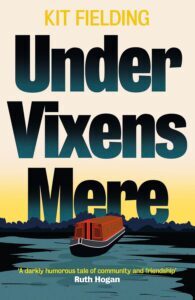 Kit Fielding’s third novel – Under Vixens Mere – is being launched/released on September 30th and is available to pre-order now from Inkspot Publishing, Amazon, and the usual outlets. The novel is set mainly at a canal marina and embraces secrets, love and more, plus murder and retribution. It is sprinkled with dark humour and touched with magic realism. Kit likes to think that there’s something in this book for everyone!
Kit Fielding’s third novel – Under Vixens Mere – is being launched/released on September 30th and is available to pre-order now from Inkspot Publishing, Amazon, and the usual outlets. The novel is set mainly at a canal marina and embraces secrets, love and more, plus murder and retribution. It is sprinkled with dark humour and touched with magic realism. Kit likes to think that there’s something in this book for everyone!
The post The Thursday Book Club – Sept 25 appeared first on Jonathan Posner.
August 23, 2025
The Thursday Book Club – August 25

The latest edition of The Thursday Book Club was broadcast on 21st August 2025 at 2pm on Phonic FM. Joining host Jonathan Posner were Cathie Hartigan and Keith Rossiter. Click the names to find out more about them, and use the audio bar below to listen to the full show.
The second hour was presented by Cathy Dodd.
 We reviewed The Lost Bookshop by Evie Woods.
We reviewed The Lost Bookshop by Evie Woods.
‘The thing about books,’ she said ‘is that they help you to imagine a life bigger and better than you could ever dream of.’
On a quiet street in Dublin, a lost bookshop is waiting to be found…
For too long, Opaline, Martha and Henry have been the side characters in their own lives.
But when a vanishing bookshop casts its spell, these three unsuspecting strangers will discover that their own stories are every bit as extraordinary as the ones found in the pages of their beloved books. And by unlocking the secrets of the shelves, they find themselves transported to a world of wonder… where nothing is as it seems.
Listen to the show (below) to find out what we thought of the book.
Available on Amazon.
Our discussion was:
Let’s talk AI again – as the tech develops, where does this go for authors?
The second hour was presented by Cathy Dodd, with a discussion on: What constitutes a good summer read? Are there any particular genres that are worthy of the accolade of a good summer read? Is there such a thing or is this a subtle way of getting people to buy books?
Cathy also played some great music!
Listen to both parts of the show in full here:
https://jonathanposnerauthor.com/wp-content/uploads/2025/08/TBC-Show-24-21-08-25.mp3The next show is at 2pm on the 18th September 2025.
NEWS Tracey and Mark Norman had a book out with The History Press on the 21st August. It’s called Devon’s Forgotten Witches 1860-1910. Witchcraft and witches throughout history have long captured the imagination, yet hidden away in archives are records of long forgotten cases. Many of these are tragic, some are unusual – perhaps even inexplicable – but all are fascinating in their own right. Devon’s Forgotten Witches 1860–1910 takes a deep dive through these records, bringing to the surface accusations of witchcraft in the county that have languished, unacknowledged, in the British Newspaper Archive for decades. These are the stories of ordinary people whose lives were touched in some way by witchcraft. The book is available from Waterstones, the usual online places (i.e. Amazon) and any good bookshop. Alternatively, you can get a copy signed by Tracey and Mark via The Folklore Podcast website.
Tracey and Mark Norman had a book out with The History Press on the 21st August. It’s called Devon’s Forgotten Witches 1860-1910. Witchcraft and witches throughout history have long captured the imagination, yet hidden away in archives are records of long forgotten cases. Many of these are tragic, some are unusual – perhaps even inexplicable – but all are fascinating in their own right. Devon’s Forgotten Witches 1860–1910 takes a deep dive through these records, bringing to the surface accusations of witchcraft in the county that have languished, unacknowledged, in the British Newspaper Archive for decades. These are the stories of ordinary people whose lives were touched in some way by witchcraft. The book is available from Waterstones, the usual online places (i.e. Amazon) and any good bookshop. Alternatively, you can get a copy signed by Tracey and Mark via The Folklore Podcast website.
 Helena Dixon’s new murder mystery Murder in Paris, comes out on August 26th. It’s the 21st Kitty Underhay mystery.
Helena Dixon’s new murder mystery Murder in Paris, comes out on August 26th. It’s the 21st Kitty Underhay mystery.
Paris, 1937. Kitty Underhay, with a croissant in hand and her handsome husband Matt by her side, is soaking up the delightfully Parisian charms of the French capital. Kitty is full of joie de vivre, but the afternoon takes a very sour turn when she stumbles across the body of a beautiful young woman, murdered in broad daylight. With a murderer in their midst, can the duo find the killer before it’s adieu for both of them? Or will this Parisian sojourn be their last?
Available on Amazon.
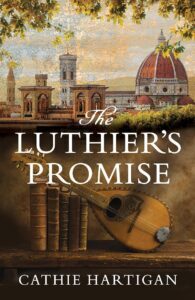 Cathie Hartigan will be signing her recently published novel, The Luthier’s Promise, in the RAMM shop on Saturday 13th September from 11 o’clock.
Cathie Hartigan will be signing her recently published novel, The Luthier’s Promise, in the RAMM shop on Saturday 13th September from 11 o’clock.
Set in 1595, Will, the lutemaker of the title, promises to bring the wayward Tudor ‘rock star’, John Dowland, safely home from Italy, but when love delays them, it is not only Will’s promise that is in jeopardy, but also their lives.
The Luthier’s Promise is available on Kindle and in paperback on Amazon.
Lin Treadgold writes historical and contemporary romantic fiction. Her new novel, The Trail to Freedom will be released in November. It’s set in World War II, and tells of Ellie and Harold, and how their relationship is damaged by the war.
 Silent Truths, Spoken Lies was Miranda Ramphul’s debut novel, which came out at the end of August, 2024. It is a compelling, fast paced psychological novel about family relationships, human weaknesses and ultimate strength, full of twists and turns.
Silent Truths, Spoken Lies was Miranda Ramphul’s debut novel, which came out at the end of August, 2024. It is a compelling, fast paced psychological novel about family relationships, human weaknesses and ultimate strength, full of twists and turns.
To mark the upcoming anniversary of its publication, it will be available on Amazon for the discounted price of £1.99 from Friday 22nd August.
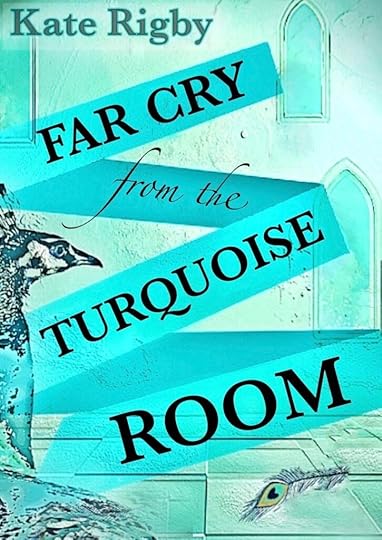 Kate Rigby reminds us of her novel Far Cry From The Turquoise Room. Told from both daughter and father’s perspectives, this is a coming-of-age, riches-to-rags tale of loss, resilience, and self-discovery, set just before the millennium. It is also about the passage of childhood into puberty. Leila is the eight-year-old daughter of Hassan Nassiri, a wealthy Iranian property owner, and younger sister to the adored Fayruz, her father’s favourite daughter. But a holiday narrowboat tragedy has far-reaching consequences for the surviving family. Hassan withdraws into reclusive grief, when he’s not escaping into work, or high jinks with his men friends at his second home in Hampstead, leaving Leila to fend for herself in a lonely world of nannies, chess and stargazing. Leila eventually runs away from home and joins a family of travellers in Sussex, and so follows a tale of adventure, danger and romance – and further anguish for her surviving family. But how will she fare at such a young age and will her family ever find her?
Kate Rigby reminds us of her novel Far Cry From The Turquoise Room. Told from both daughter and father’s perspectives, this is a coming-of-age, riches-to-rags tale of loss, resilience, and self-discovery, set just before the millennium. It is also about the passage of childhood into puberty. Leila is the eight-year-old daughter of Hassan Nassiri, a wealthy Iranian property owner, and younger sister to the adored Fayruz, her father’s favourite daughter. But a holiday narrowboat tragedy has far-reaching consequences for the surviving family. Hassan withdraws into reclusive grief, when he’s not escaping into work, or high jinks with his men friends at his second home in Hampstead, leaving Leila to fend for herself in a lonely world of nannies, chess and stargazing. Leila eventually runs away from home and joins a family of travellers in Sussex, and so follows a tale of adventure, danger and romance – and further anguish for her surviving family. But how will she fare at such a young age and will her family ever find her?
Available on Amazon.
 Jonathan Posner has a ‘Meet the Author’ event coming up on September 25th at the Ivybridge Bookshop. He’ll be introducing and reading from his Tudor adventure The Lawyer’s Legacy, and there will be signed copies available. It’s at 5:30pm, and it’s FREE, so do please come along.
Jonathan Posner has a ‘Meet the Author’ event coming up on September 25th at the Ivybridge Bookshop. He’ll be introducing and reading from his Tudor adventure The Lawyer’s Legacy, and there will be signed copies available. It’s at 5:30pm, and it’s FREE, so do please come along.
More info on the event at ivybridgebookshop.com.
The Lawyer’s Legacy is available on Amazon.
 On that subject, there are also talks by authors we’ve featured on The Thursday Book Club, all at 5:30pm.
On that subject, there are also talks by authors we’ve featured on The Thursday Book Club, all at 5:30pm.
Go to ivybridgebookshop.com for more details, or register at in**@iv***************.com.
 Calling all budding (and seasoned) novelists! Entries are open for the Exeter Novel Prize, now organised by Word Kitchen. There’s a £1,000 first prize, and entries will be judged by noted London literary agent, Hellie Ogden. Go to https://www.wordkitchen.org.uk/exeter-novel-prize for more information on how to enter. Good luck!
Calling all budding (and seasoned) novelists! Entries are open for the Exeter Novel Prize, now organised by Word Kitchen. There’s a £1,000 first prize, and entries will be judged by noted London literary agent, Hellie Ogden. Go to https://www.wordkitchen.org.uk/exeter-novel-prize for more information on how to enter. Good luck!
 A new adult novel came out at the end of July by children’s author Amy Sparkes. It’s called The Players – Act 1: All the World’s a Stage.
A new adult novel came out at the end of July by children’s author Amy Sparkes. It’s called The Players – Act 1: All the World’s a Stage.
How far would you go to save what you truly love?
England, 1715. When society doesn’t understand you, and your family is out of the picture, a strolling theatre company could be your perfect home…
Ambitious lead actor Thomas is determined to reach Drury Lane and prove to his father that he is not a failure.
Fierce Caroline has a traumatic past and is determined to protect the company which saved her.
Kind-hearted Annie just wants to look after her found family.
So, when their heartbroken manager Robert is injured and decides to fold the struggling company, the players are resolved to change his mind, whatever the cost. Unfortunately, the odds are stacked against them. They’ve lost their stage, they still haven’t got a skull for Hamlet, and flamboyant ex-member Piero is hunting them down, with a spot of revenge on his mind…
Is it time for the final bow?
Available on Amazon.
 Keith and Jonathan will be presenting a writers’ workshop at the Dartmouth Book Festival. The workshop is called ‘Creating Great Characters‘.
Keith and Jonathan will be presenting a writers’ workshop at the Dartmouth Book Festival. The workshop is called ‘Creating Great Characters‘.
It’s on the 19th September at 2pm in the Flavel Studio, Dartmouth.
Book via the Flavel Centre website, or use this link.
 Thomas R Weaver has a new book out this month that ties in with our discussion on AI. It’s called Artificial Wisdom.
Thomas R Weaver has a new book out this month that ties in with our discussion on AI. It’s called Artificial Wisdom.
Who would you trust with the future?
The year is 2050. In the teeth of a climate catastrophe, the world is left with a drastic solution: one global leader to steer it through the coming apocalypse.
The final two candidates are ex-US President Lockwood, and Solomon, the world’s first political artificial intelligence.
As whispers of a global conspiracy emerge, investigative journalist Marcus Tully finds himself at the centre of it – when Solomon’s creator turns up murdered.
Overnight, one investigation becomes two, and it’s not just the result of the election that’s at stake but the future of the species. Suddenly humanity must make an impossible choice – between salvation, or freedom.
Available on Amazon.
 Richard Frost’s new self-improvement book Loving Yourself came out in July. Available on Amazon.
Richard Frost’s new self-improvement book Loving Yourself came out in July. Available on Amazon.
There’s a launch event on Thursday 18th September at Exeter Cathedral 6:15 – 7:15pm. Details and to reserve your place, at richardfrostauthor.com.
The post The Thursday Book Club – August 25 appeared first on Jonathan Posner.
July 20, 2025
The Thursday Book Club – July 25

The latest edition of The Thursday Book Club was broadcast on 17th July 2025 at 2pm on Phonic FM. Joining host Jonathan Posner were Angie Wooldridge and Jason Mann. Click the names to find out more about them, and use the audio bar below to listen to the full show.
The second hour was presented by Cathy Dodd.
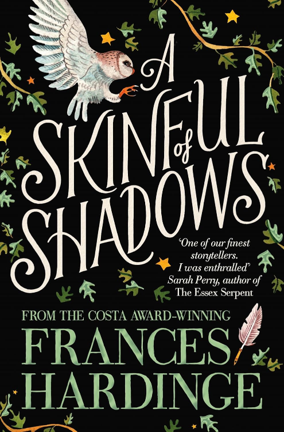 We reviewed A Skinful of Shadows by Frances Hardinge.
We reviewed A Skinful of Shadows by Frances Hardinge.
When a creature dies, its spirit can go looking for somewhere to hide.
Some people have space inside them, perfect for hiding.
Makepeace, a courageous girl with a mysterious past, defends herself nightly from the ghosts which try to possess her. Then a dreadful event causes her to drop her guard for a moment.
And now there’s a ghost inside her.
The spirit is wild, brutish and strong, but it may be her only defence in a time of dark suspicion and fear. As the English Civil War erupts, Makepeace must decide which is worse: possession – or death.
Available on Amazon.
The second hour was again presented by Cathy Dodd, with a discussion on What makes a good or bad author reading?
Cathy also played some great music!
Listen to both parts of the show in full here:
https://jonathanposnerauthor.com/wp-content/uploads/2025/07/TBC-Show-23-17-07-25.mp3The next show is at 2pm on the 21st August 2025.
NEWS Carryl Church tells us that her second novel with Joffe Books came out in June. It’s called Secrets at the Ambrose Café and is set in Exeter in 1925. Della Wilde has set aside her dream of moving to Paris to study at the renowned Le Cordon Bleu, choosing instead to support her family torn apart by war. By night, she works at the prestigious Ambrose Café, serving the city’s elite – and feels utterly invisible.
Carryl Church tells us that her second novel with Joffe Books came out in June. It’s called Secrets at the Ambrose Café and is set in Exeter in 1925. Della Wilde has set aside her dream of moving to Paris to study at the renowned Le Cordon Bleu, choosing instead to support her family torn apart by war. By night, she works at the prestigious Ambrose Café, serving the city’s elite – and feels utterly invisible.
Until a chance encounter with rebellious Alice Winters, the daughter of a powerful MP, upends Della’s world. Available on Amazon.
 Georgia Hill has a new historical romance out. Very much rooted in Devon, The Sea Glass Necklace is inspired by the finding of the Seaton Down Hoard, a huge collection of Roman coins. It’s a dual timeline narrative, telling the stories of Juno in contemporary Devon and Flavia in Roman Britain – and their search for new beginnings. Here’s the overview: Two women seek a new beginning. For one, it will end in tragedy. Available on Amazon and other platforms.
Georgia Hill has a new historical romance out. Very much rooted in Devon, The Sea Glass Necklace is inspired by the finding of the Seaton Down Hoard, a huge collection of Roman coins. It’s a dual timeline narrative, telling the stories of Juno in contemporary Devon and Flavia in Roman Britain – and their search for new beginnings. Here’s the overview: Two women seek a new beginning. For one, it will end in tragedy. Available on Amazon and other platforms.
 Ebberley Finch’s new book is called The Seaside Sisterhood, and should be a perfect summer holiday read. Set on the coast in Cornwall, it’s an enjoyable tale of love, friendship, sisterhood and new beginnings. Available on Amazon.
Ebberley Finch’s new book is called The Seaside Sisterhood, and should be a perfect summer holiday read. Set on the coast in Cornwall, it’s an enjoyable tale of love, friendship, sisterhood and new beginnings. Available on Amazon.
 Lizzie Khalil’s story of growing up in Devonport Plymouth is called Devonport Maid. It charts the true-life story of Lizzie, an unwanted, tiny, black baby girl who is unceremoniously abandoned at birth by her delinquent teenage mother, leaving her in a predominantly white town. It’s the story of her fight to come to terms with her lot. After surviving years of relentless bullying and racial abuse, and a DNA test had revealed the shocking and earth-shattering truth about her “deliberately hidden beginnings” Lizzie makes herself the master of her own destiny, deciding she had one of two choices: either sink or swim. Available on Amazon.
Lizzie Khalil’s story of growing up in Devonport Plymouth is called Devonport Maid. It charts the true-life story of Lizzie, an unwanted, tiny, black baby girl who is unceremoniously abandoned at birth by her delinquent teenage mother, leaving her in a predominantly white town. It’s the story of her fight to come to terms with her lot. After surviving years of relentless bullying and racial abuse, and a DNA test had revealed the shocking and earth-shattering truth about her “deliberately hidden beginnings” Lizzie makes herself the master of her own destiny, deciding she had one of two choices: either sink or swim. Available on Amazon.
 Mary Georgina de Grey has recently been featured on Amber Daulton’s blog, Sexy Stories with Heart. It’s an in depth interview with her main character in Then The Earth Moved, Isla Bruni. Here’s the blurb for the book: Talented designer Isla Bruni is keen to widen her experience before setting up her own interiors business, so she accepts an exchange with a top studio located in an Italian hilltop town. She doesn’t trust Italian men – after all, hasn’t she had a good reason? But irresistible, sexy entrepreneur Edmondo Benedetti turns her carefully ordered life upside down. How can she realize her ambitions without sacrificing love? Only when she’s thrust into danger does she begin to understand what is important. The past is the past – yet if secrets buried there resurface, could they destroy her future?
Mary Georgina de Grey has recently been featured on Amber Daulton’s blog, Sexy Stories with Heart. It’s an in depth interview with her main character in Then The Earth Moved, Isla Bruni. Here’s the blurb for the book: Talented designer Isla Bruni is keen to widen her experience before setting up her own interiors business, so she accepts an exchange with a top studio located in an Italian hilltop town. She doesn’t trust Italian men – after all, hasn’t she had a good reason? But irresistible, sexy entrepreneur Edmondo Benedetti turns her carefully ordered life upside down. How can she realize her ambitions without sacrificing love? Only when she’s thrust into danger does she begin to understand what is important. The past is the past – yet if secrets buried there resurface, could they destroy her future?
The book is available on Amazon.
The blog is here.
 Cirencester Author Heidi Sinton released her debut YA Sci-fi Novel Less Than on July 1st. Evie Lawson is an anomaly. Fifteen years old and nearly powerless in a world shaped by four extraordinary abilities known as Docers, she’s ostracised and labelled a ‘Less Than’ – a class pushed to the margins of society. Segregated to a special school for those deemed unworthy of a proper education, Evie and her tight-knit group of friends must navigate growing up in a world built to keep them down. When one of their own dares to rise above their station, they discover that true strength goes beyond what you can do. This YA Science-Fiction book is perfect for fans of emotional, character-driven stories. It explores the limits of friendship, the cost of ambition, and the strength it takes to rise above. It’s available on Amazon in paperback, Kindle and Kindle unlimited.
Cirencester Author Heidi Sinton released her debut YA Sci-fi Novel Less Than on July 1st. Evie Lawson is an anomaly. Fifteen years old and nearly powerless in a world shaped by four extraordinary abilities known as Docers, she’s ostracised and labelled a ‘Less Than’ – a class pushed to the margins of society. Segregated to a special school for those deemed unworthy of a proper education, Evie and her tight-knit group of friends must navigate growing up in a world built to keep them down. When one of their own dares to rise above their station, they discover that true strength goes beyond what you can do. This YA Science-Fiction book is perfect for fans of emotional, character-driven stories. It explores the limits of friendship, the cost of ambition, and the strength it takes to rise above. It’s available on Amazon in paperback, Kindle and Kindle unlimited.
 Following on with a similar theme, Stoat Books in Plymouth have published Robert Garnham’s novel The Neon Yak. Robert is a Paignton-based comedy performance poet and writer, active all over the UK. The Neon Yak is a deeply introspective novel that explores the challenges of growing up different. Set in the heart of 1980s suburbia, it follows Daniel Cooper, a boy caught between his true self and the expectations imposed upon him. As he navigates school bullies, family tensions, and the constant backdrop of motorways and distant city lights, Daniel finds refuge in books, music, and his vivid imagination. Amidst his struggle with societal norms and self-discovery, a voice from within—embodied by the captivating and enigmatic Tina—urges him to embrace his authentic identity. Available on Amazon.
Following on with a similar theme, Stoat Books in Plymouth have published Robert Garnham’s novel The Neon Yak. Robert is a Paignton-based comedy performance poet and writer, active all over the UK. The Neon Yak is a deeply introspective novel that explores the challenges of growing up different. Set in the heart of 1980s suburbia, it follows Daniel Cooper, a boy caught between his true self and the expectations imposed upon him. As he navigates school bullies, family tensions, and the constant backdrop of motorways and distant city lights, Daniel finds refuge in books, music, and his vivid imagination. Amidst his struggle with societal norms and self-discovery, a voice from within—embodied by the captivating and enigmatic Tina—urges him to embrace his authentic identity. Available on Amazon.
 Elizabeth Keysian has just got a new book out with Dragonblade Publishing, for those readers who fancy Regency romances with a little bit of spice. It’s called The Lyon Rampant, and is set partly in London and partly on Dartmoor. It’s the start of an ambitious series based on the fictional Lyon’s Den, an exclusive gentleman’s gaming club run by an extremely unconventional matchmaker. Available on Amazon.
Elizabeth Keysian has just got a new book out with Dragonblade Publishing, for those readers who fancy Regency romances with a little bit of spice. It’s called The Lyon Rampant, and is set partly in London and partly on Dartmoor. It’s the start of an ambitious series based on the fictional Lyon’s Den, an exclusive gentleman’s gaming club run by an extremely unconventional matchmaker. Available on Amazon.
 Carey Jane Rowland is a local poet who has recently self-published two collections of modern poetry and prose. Both books are now available on Amazon. Letters of Love is a heartfelt collection of love poems that explore connection, vulnerability, and the beauty of emotional expression. Available on Amazon.
Carey Jane Rowland is a local poet who has recently self-published two collections of modern poetry and prose. Both books are now available on Amazon. Letters of Love is a heartfelt collection of love poems that explore connection, vulnerability, and the beauty of emotional expression. Available on Amazon.
 It Hasn’t Stopped Raining Since You Left is a moving collection of poetry delving into heartbreak, loss, and longing. Available on Amazon
It Hasn’t Stopped Raining Since You Left is a moving collection of poetry delving into heartbreak, loss, and longing. Available on Amazon
 Here is the South Hams Literary Festival line-up on Saturday 4th October – with interviews by our very own Cathy Dodd:
Here is the South Hams Literary Festival line-up on Saturday 4th October – with interviews by our very own Cathy Dodd:
Spaces are limited on all events, but the good news is that tickets are free! They must be bookked in advance on Eventbrite.
Other Festivals also mentioned on the show:
Appledore Book Festival – 12-21 September. Tickets from July 26th. More Info.
Budleigh Salterton Literary Festival – 17-21 September. More Info.
North Cornwall Book Festival 25-28 Septenber. More Info.
International Agatha Christie Festival – 13-21 September. More Info.
The post The Thursday Book Club – July 25 appeared first on Jonathan Posner.
June 23, 2025
The Thursday Book Club – June 25
 The latest edition of The Thursday Book Club was broadcast on 19th June 2025 at 2pm on Phonic FM. Joining host Jonathan Posner were Angie Wooldridge and Cathie Hartigan. Click the names to find out more about them, and use the audio bar below to listen to the full show.
The latest edition of The Thursday Book Club was broadcast on 19th June 2025 at 2pm on Phonic FM. Joining host Jonathan Posner were Angie Wooldridge and Cathie Hartigan. Click the names to find out more about them, and use the audio bar below to listen to the full show.
 We reviewed The Cautious Traveller’s Guide to The Wastelands by Sarah Brooks.
We reviewed The Cautious Traveller’s Guide to The Wastelands by Sarah Brooks.
A woman on the platform with a borrowed name.
A disgraced naturalist determined to discover miracles.
A child with a dangerous secret.
Welcome aboard The Great Trans-Siberian Express.
It is the 19th Century and the world is awash with marvels. But there is nothing so marvellous and terrible as the Wastelands: a vast terrain that lies between Russia and China.
Nothing touches this deadly wilderness except the Great Trans-Siberian Express: an impenetrable train built to carry precious cargo across continents, but which now also transports anyone willing to cross the irresistible Wastelands.
The train is never short of travellers. After all, the train is completely safe.
Except . . . something happened on the last journey. No can remember exactly what, not even Weiwei, the famous ‘child of the train’ who was born on the Express.
The Trans-Siberia Company insist everything has been fixed. But the old rules are changing at a remarkable speed, and as secrets and stories of this curious cast of characters begin to unravel, something uncontrollable appears to be breaking in . . .
This month the second hour, was given over to a new presenter called Cathy Dodd. So do give her your support and keep listening after The Thursday Book Club finishes!
Listen to both parts of the show in full here:
https://jonathanposnerauthor.com/wp-content/uploads/2025/06/TBC-Show-22-19-06-25.mp3The next show is at 2pm on the 17th July 2025.
NEWS
 Jonathan met author Jill McRae-Spencer at a recent South Hams Author day in Ivybridge. Jill told him about her book What Kathleen Did:
Jonathan met author Jill McRae-Spencer at a recent South Hams Author day in Ivybridge. Jill told him about her book What Kathleen Did:
It is 1929 and 18-year-old Kathleen, from a middle-class London family, travels to Devon with her friend Alice. There she meets Jim Wilcox, a tenant farmer with traditional views on marriage, and Robert Neville, heir to Alston Manor.
Kathleen, representing the modern woman, wants more than just marriage – a sentiment reflecting post-war societal changes where women outnumbered men by nearly two million.
Seduced by Jim, Kathleen becomes pregnant, forcing her to marry him and become a farmer’s wife – a life far from her dreams. She is haunted by thoughts of a different future with Robert, who symbolises a happier alternative. As World War II begins, new opportunities arise for for Kathleen, but her path to freedom comes at a significant personal cost.
Available on Amazon.
 Karen Hedges, Sidmouth’s amateur astronomer and volunteer at the Norman Lockyer Observatory, says she held a successful book launch at Exeter Central Library, supported by Winstone’s Bookshop, Sidmouth, who sold nearly 20 copies of Karen’s new Stargazing for All at the launch. The book is available from Waterstones, Amazon, and available to order from all good bookshops.
Karen Hedges, Sidmouth’s amateur astronomer and volunteer at the Norman Lockyer Observatory, says she held a successful book launch at Exeter Central Library, supported by Winstone’s Bookshop, Sidmouth, who sold nearly 20 copies of Karen’s new Stargazing for All at the launch. The book is available from Waterstones, Amazon, and available to order from all good bookshops.
 South Gloucestershire based author Ali Bacon has been busy launching her latest historical novel The Absent Heart in Bristol and points north. The Absent Heart is inspired by the letters of Robert Louis Stevenson, and tells the story of Frances Sitwell, Stevenson’s muse and companion to his close friend. The men in her life dominated the literary history of the period, but Ali has unpicked this Victorian love-triangle and gives the intelligent and famously beautiful Sitwell her rightful place. The book is published by Linen Press who this month are also reissuing Ali’s previous historical novel In The Blink of an Eye (inspired by the life of an early Scottish photographer) with a new cover.
South Gloucestershire based author Ali Bacon has been busy launching her latest historical novel The Absent Heart in Bristol and points north. The Absent Heart is inspired by the letters of Robert Louis Stevenson, and tells the story of Frances Sitwell, Stevenson’s muse and companion to his close friend. The men in her life dominated the literary history of the period, but Ali has unpicked this Victorian love-triangle and gives the intelligent and famously beautiful Sitwell her rightful place. The book is published by Linen Press who this month are also reissuing Ali’s previous historical novel In The Blink of an Eye (inspired by the life of an early Scottish photographer) with a new cover.
Available on Amazon.
 The next free Writing at the Edge Webinar is on Thursday 3rd July. It will be Jonathan being interviewed by one of our regular guests on The Thursday Book Club, Jason Mann. The topic is Doing the Business. How to navigate the tricky waters of the publishing industry. Traditional, Self-publishing or something in-between, Hybrid. Which option is best for you? Tune in on the Writing at the Edge YouTube channel at 8pm on Thursday 3rd July.
The next free Writing at the Edge Webinar is on Thursday 3rd July. It will be Jonathan being interviewed by one of our regular guests on The Thursday Book Club, Jason Mann. The topic is Doing the Business. How to navigate the tricky waters of the publishing industry. Traditional, Self-publishing or something in-between, Hybrid. Which option is best for you? Tune in on the Writing at the Edge YouTube channel at 8pm on Thursday 3rd July.
Here’s the ticket link to book your FREE place.
Also, if you go to the Writing at the Edge YouTube channel, there’s a wealth of other webinars on writing topics.
 Kate Rigby tells us she has an eBook up on pre-order. It’s The Little Guide To Pet Peeves – from an Autist’s Perspective, which is coming out June 28th. This was first written as a series of blogs before and during lockdown, and Kate has expanded it in several areas – she says it is a growing and evolving project. Following her unfashionably late ASD (Autistic Spectrum Disorder) and ADHD diagnosis in her sixties, she now realises how pertinent some of this was to the strong dislikes and aversions she and her fellow autists experience. Available to pre-order on Amazon.
Kate Rigby tells us she has an eBook up on pre-order. It’s The Little Guide To Pet Peeves – from an Autist’s Perspective, which is coming out June 28th. This was first written as a series of blogs before and during lockdown, and Kate has expanded it in several areas – she says it is a growing and evolving project. Following her unfashionably late ASD (Autistic Spectrum Disorder) and ADHD diagnosis in her sixties, she now realises how pertinent some of this was to the strong dislikes and aversions she and her fellow autists experience. Available to pre-order on Amazon.
Lexie Day tells us that the Chipping Sodbury Book Fair is on 19th July, 10am to 4pm and is in a good cause – raising money for children’s charities. It’s at the Chipping Sodbury Town Hall, and has authors, crafts, a secondhand book sale and more for the whole family! Entry is free. Browse through a wide selection of books from various genres, meet authors, and maybe even discover your new favorite read. Whether you’re a bookworm or just looking for a good read, this event is perfect for all book lovers. Don’t miss out on this opportunity to immerse yourself in the world of literature! Book your entry here.
Jonathan mentioned that as part of the South Hams Literary Festival, there was a Writers’ Day on Saturday. There was a drop-in session for writers to get advice, help and inspiration from other writers. It was a great day, with lots of local authors and readers looking for help and advice, which we were all happy to give!
 Poole based author Flora McGowan has just re-published a new version of her first novel Material Witness which is part of the Carrie and Keith Mystery series. Set during the summer of 2012 on the English south coast, this light-hearted ghost story follows Carrie as she discovers a passion for internet hopping, and develops an addiction for vintage clothes. Her interest is piqued by a Victorian mourning cloak, and deciding to delve into the background of its former owner, she adds a wedding dress to her collection. However, she feels cheated when the promised photograph of the original bride is missing from the parcel, and she sets out to track down what she sees as her property.
Poole based author Flora McGowan has just re-published a new version of her first novel Material Witness which is part of the Carrie and Keith Mystery series. Set during the summer of 2012 on the English south coast, this light-hearted ghost story follows Carrie as she discovers a passion for internet hopping, and develops an addiction for vintage clothes. Her interest is piqued by a Victorian mourning cloak, and deciding to delve into the background of its former owner, she adds a wedding dress to her collection. However, she feels cheated when the promised photograph of the original bride is missing from the parcel, and she sets out to track down what she sees as her property.
Each Carrie and Keith Mystery book can be read as a standalone story. Material Witness is currently available as an ebook on special offer from Amazon for 77p. There is also a paperback version, and for the first time there is an audio version from Apple books. It’s a ghost story with a mystery!
 Becca Rogers’ debut children’s novel, The Girl with Gills, is released by Zephyr books on July 3rd. This is an original, middle grade fantasy debut awash with adventure. A determined heroine and a sinister villain clash to reveal river lore in a watery world of fantastical creatures and colossal challenges.
Becca Rogers’ debut children’s novel, The Girl with Gills, is released by Zephyr books on July 3rd. This is an original, middle grade fantasy debut awash with adventure. A determined heroine and a sinister villain clash to reveal river lore in a watery world of fantastical creatures and colossal challenges.
In a time and place which might be now, people with gills, outcast larkers, live in secret communities.
They have houseboats along the river. Concealing their gills from land lubbers, they scour the mudbanks, trade their finds and live off their wits. Thirteen-year-old Effra has been supporting her brother, Fleet, alone since their beloved grandfather died six months ago.
When merciless Rivermun, a larker gone bad, threatens Fleet, Effra’s quest begins. Rivermun asks for the impossible – he wants to overpower Mother River, to possess the river serpent’s pearl and for age-old debts to be settled. Effra must bargain with the imposing Mother River, dive into the underwater parts of the city, venture deep into the Rat Queen’s lair and confront the terrible river serpent to save not only Fleet, but everything the larkers stand for. Luckily, she is not alone. She befriends a sentient sewer rat and a landlubber girl called Bow, who will help her in her quest.
Becca’s book launch is on the evening of Friday 4th July at Waterstones on Exeter High street. Visit the Waterstones Exeter website events page for (free) tickets and further details, or pre-order on Amazon.
The post The Thursday Book Club – June 25 appeared first on Jonathan Posner.
May 18, 2025
The Thursday Book Club – May 25

The latest edition of The Thursday Book Club was broadcast on 15th May 2025 at 2pm on Phonic FM. Joining host Jonathan Posner were Angie Wooldridge and Keith Rossiter. Click the names to find out more about them, and use the audio bar below to listen to the full show.
 We reviewed Washington Black by Esi Edugyan.
We reviewed Washington Black by Esi Edugyan.
When two English brothers take the helm of a Barbados sugar plantation, Washington Black – an eleven-year-old field slave – finds himself selected as personal servant to one of them. The eccentric Christopher ”Titch” Wilde is a naturalist, explorer, scientist, inventor and abolitionist, whose single-minded pursuit of the perfect aerial machine mystifies all around him.Titch”s idealistic plans are soon shattered and Washington finds himself in mortal danger. They escape together, but then Titch disappears and Washington must make his way alone, following the promise of freedom further than he ever dreamed possible.Inspired by a true story, Washington Black is an extraordinary tale of a world destroyed and made whole again.
This month I again carried on for the second hour, playing some old favourite tunes from 1984. So if you love these, keep listening after The Thursday Book Club finishes!
Listen to both parts of the show in full here:
https://jonathanposnerauthor.com/wp-content/uploads/2025/05/TBC-Show-21-15-05-25.mp3The next show is at 2pm on the 19th June 2025.
The interview was with Pippa Marriott of Word Kitchen.

Word Kitchen’s next event:
June 10th – Summer Stories – Word Kitchen’s Prose Night at the Exeter Phoenix
NEWS Diana K. Robinson’s book, Don’t Blame Me is about a brave woman’s struggles living with a man with no conscience—a man she once loved but then despises. Dion, the antagonist, is a sociopathic, narcissistic alcoholic who can charm the socks off anyone he wants to, and gets away with it just once too often – that is, until the web of lies finally catches up with him. Diana says, “Many women find themselves trapped in marriages they think they can’t escape from. This book not only offers the reader inspiration, but Elizabeth’s life is a roller coaster of events, some unbelievable, others heartbreaking and some frustrating. It’s an incredible tale of persistence and endurance through a very difficult life, and the crazy decisions she makes. Don’t Blame Me is available on Amazon as an ebook, Paperback, Kindle, and Kindle Unlimited.
Diana K. Robinson’s book, Don’t Blame Me is about a brave woman’s struggles living with a man with no conscience—a man she once loved but then despises. Dion, the antagonist, is a sociopathic, narcissistic alcoholic who can charm the socks off anyone he wants to, and gets away with it just once too often – that is, until the web of lies finally catches up with him. Diana says, “Many women find themselves trapped in marriages they think they can’t escape from. This book not only offers the reader inspiration, but Elizabeth’s life is a roller coaster of events, some unbelievable, others heartbreaking and some frustrating. It’s an incredible tale of persistence and endurance through a very difficult life, and the crazy decisions she makes. Don’t Blame Me is available on Amazon as an ebook, Paperback, Kindle, and Kindle Unlimited.
 Helen Baggott is an author and speaker from Dorset who has just released Memories from the Future.
Helen Baggott is an author and speaker from Dorset who has just released Memories from the Future.
This is the first in a new series of books exploring the history of Exmoor. Helen usually writes non-fiction books about genealogy and postcards sent before the First World War, but Memories from the Future is a genealogical novel that weaves a plot around people who were in the region in 1911. Whilst all the encounters are fiction, the stories are based on newspaper archives. In the book, a character called Arthur gathers the local stories, which are then discovered more than a hundred years later. The book is
available from Amazon for £7.99 and is published by Stourcastle Books. It is illustrated with black and white images of postcards from the era.
 Caro Ayre’s second book in the Detective Inspector Gavin McKay mystery series is out on the 22nd May. The first book was The Mallaig Link, where Gavin’s old enemy becomes his boss. This new one, The Perfect Alibi, is the sequel, and sees DI Mckay taking on two cases – a potential suicide and the kidnap of five-year-old twins, while trying to find a balance between his work and personal life. If you like police procedurals you should enjoy this not too cosy crime novel! Pre-order on Amazon.
Caro Ayre’s second book in the Detective Inspector Gavin McKay mystery series is out on the 22nd May. The first book was The Mallaig Link, where Gavin’s old enemy becomes his boss. This new one, The Perfect Alibi, is the sequel, and sees DI Mckay taking on two cases – a potential suicide and the kidnap of five-year-old twins, while trying to find a balance between his work and personal life. If you like police procedurals you should enjoy this not too cosy crime novel! Pre-order on Amazon.
 An author who we’ve featured before has a new book out. Ebberley Finch, whose novel Lock, Stock and Harold we reviewed last month, has her next novel out on May 20th. It’s called The Seaside Sisterhood. Here’s the blurb: Betrayed by her husband, Kate is determined to rebuild her life and her confidence. Packing up her shattered life and her two children, she abandons London for the Cornish coast. Is her move the first step towards a new and fulfilling future, or a reckless dream destined to fail?
An author who we’ve featured before has a new book out. Ebberley Finch, whose novel Lock, Stock and Harold we reviewed last month, has her next novel out on May 20th. It’s called The Seaside Sisterhood. Here’s the blurb: Betrayed by her husband, Kate is determined to rebuild her life and her confidence. Packing up her shattered life and her two children, she abandons London for the Cornish coast. Is her move the first step towards a new and fulfilling future, or a reckless dream destined to fail?
Half a world away in Bangkok, Lawana is swept off her feet by a handsome and charismatic lover. As she follows a man she barely knows into an uncertain future, will she discover the dream life he promised?
In pursuit of security and happiness, both women find themselves caught in a tangled web of love and deception. Unexpected twists change not only their lives, but the lives of those they love. Two women, one husband. What could possibly go wrong? You can pre-order on Amazon.
 The Shout, Celia Ann Merrill’s new book of poetry, came out on April 23rd. With many light-hearted poems and some more poignant, it illustrates and celebrates the sights, sounds, emotions and experiences that have been enjoyed in the inspiring and beautiful environment of Appledore. It raises funds for the Appledore RNLI. Available on Amazon.
The Shout, Celia Ann Merrill’s new book of poetry, came out on April 23rd. With many light-hearted poems and some more poignant, it illustrates and celebrates the sights, sounds, emotions and experiences that have been enjoyed in the inspiring and beautiful environment of Appledore. It raises funds for the Appledore RNLI. Available on Amazon.
 Brett Orchard’s book, Patriot came out on 20th April. Partly set in Colyton, it tells the story of Rebecca – an ex-spy who’s pulled back into the world of espionage. It’s perfect for fans of fast-paced espionage thrillers and political intrigue. This gripping novel will keep you on the edge of your seat until the very last page. Available on Amazon.
Brett Orchard’s book, Patriot came out on 20th April. Partly set in Colyton, it tells the story of Rebecca – an ex-spy who’s pulled back into the world of espionage. It’s perfect for fans of fast-paced espionage thrillers and political intrigue. This gripping novel will keep you on the edge of your seat until the very last page. Available on Amazon.
 The ND Lovers Club: How Neurodivergent Women Lust, Like, and Love by Bontle Senne and Sara-Louise Ackrill was published in February. The book aims to break down the barriers of shame and stereotypes to show that neurodivergent women don’t just deserve love—they excel at it. This unapologetically feminist manifesto-meets-self-help book dives into the messy, magical world of dating, sex, and relationships as experienced by neurodivergent women. With wit, wisdom, and plenty of f-bombs, Senne and Ackrill explore how ADHD, autism, and other neurodivergent identities shape how women approach intimacy. It’s available on Amazon.
The ND Lovers Club: How Neurodivergent Women Lust, Like, and Love by Bontle Senne and Sara-Louise Ackrill was published in February. The book aims to break down the barriers of shame and stereotypes to show that neurodivergent women don’t just deserve love—they excel at it. This unapologetically feminist manifesto-meets-self-help book dives into the messy, magical world of dating, sex, and relationships as experienced by neurodivergent women. With wit, wisdom, and plenty of f-bombs, Senne and Ackrill explore how ADHD, autism, and other neurodivergent identities shape how women approach intimacy. It’s available on Amazon.
 As part of the South Hams Literary Festival, there’s a Writers’ Day on Saturday 14th June, from 10:30 to 3:30 at the Unit 8 Gym in Ivybridge. Ther’s a drop-in session for writers to get advice, help and inspiration from other writers. There’ll also be guest speakers, a networking lunch, and lots more! Free entry. Free parking. Refreshments available. All welcome. Whatever level of writing you’re at, there will be something of interest to you. Just drop in. No need to book.
As part of the South Hams Literary Festival, there’s a Writers’ Day on Saturday 14th June, from 10:30 to 3:30 at the Unit 8 Gym in Ivybridge. Ther’s a drop-in session for writers to get advice, help and inspiration from other writers. There’ll also be guest speakers, a networking lunch, and lots more! Free entry. Free parking. Refreshments available. All welcome. Whatever level of writing you’re at, there will be something of interest to you. Just drop in. No need to book.
 Alice Hunter tells us that her 5th novel publishes 22nd May. It’s called The Perfect Psychopath and draws on her own experience working in a prison. She says that she thoroughly enjoyed writing some twisted characters! Go to Amazon to pre-order this gripping, new, edge-of-your-seat crime thriller from the bestselling author of the smash-hit novel The Serial Killer’s Wife, which is now a major TV series.
Alice Hunter tells us that her 5th novel publishes 22nd May. It’s called The Perfect Psychopath and draws on her own experience working in a prison. She says that she thoroughly enjoyed writing some twisted characters! Go to Amazon to pre-order this gripping, new, edge-of-your-seat crime thriller from the bestselling author of the smash-hit novel The Serial Killer’s Wife, which is now a major TV series.
 Mark Norman’s 7th book Hallowed Ground: The Folklore of Churches and Churchyards is coming out in the UK on 17th June, and can be pre-ordered on Amazon. It’s already out in the States. He tells us he has two more titles (one with Harper Collins for the National Trust and one with The History Press) out later this year.
Mark Norman’s 7th book Hallowed Ground: The Folklore of Churches and Churchyards is coming out in the UK on 17th June, and can be pre-ordered on Amazon. It’s already out in the States. He tells us he has two more titles (one with Harper Collins for the National Trust and one with The History Press) out later this year.
 Jenny Scott’s new illustrated children’s book came out on 3rd May. Jenny is the author of the Sammy Rambles and Molly Manila books. This book is called Dasher and Digger the Dogs and Friends, and is part of the 43-book series called Bumper and Friends. Dasher is the quietest dog on the farm and Digger is the loudest. It is their job to round up the sheep and they are very good at it. But when Digger loses his voice on the day of the National Sheepdog Trials, Dasher needs to take his place. Will anyone notice that the dogs have changed places and can Dasher overcome her shyness to take part in the competition? Available from Amazon.
Jenny Scott’s new illustrated children’s book came out on 3rd May. Jenny is the author of the Sammy Rambles and Molly Manila books. This book is called Dasher and Digger the Dogs and Friends, and is part of the 43-book series called Bumper and Friends. Dasher is the quietest dog on the farm and Digger is the loudest. It is their job to round up the sheep and they are very good at it. But when Digger loses his voice on the day of the National Sheepdog Trials, Dasher needs to take his place. Will anyone notice that the dogs have changed places and can Dasher overcome her shyness to take part in the competition? Available from Amazon.
 Helena Dixon is appearing at Bristol Crime Fest which starts today and runs to Sunday 18th May, with a host of other fabulous authors. Also book 20 in her bestselling Miss Underhay series, Murder at the English Manor set near Bovey Tracey, is out on May 23rd. Find on Amazon.
Helena Dixon is appearing at Bristol Crime Fest which starts today and runs to Sunday 18th May, with a host of other fabulous authors. Also book 20 in her bestselling Miss Underhay series, Murder at the English Manor set near Bovey Tracey, is out on May 23rd. Find on Amazon.
The post The Thursday Book Club – May 25 appeared first on Jonathan Posner.
April 21, 2025
The Thursday Book Club – April 25

The latest edition of The Thursday Book Club was broadcast on 17th April 2025 at 2pm on Phonic FM. Joining host Jonathan Posner were Cathie Hartigan and Jason Mann. Click the names to find out more about them, and use the audio bar below to listen to the full show.

We reviewed Lock, Stock and Harold by Ebberley Finch.
Many thanks also to Cejay Leslie for their comment on the book: “I’m reading it at present and finding it very enjoyable.- well drawn characters and a lovely written style.”
This month I again carried on for the second hour, playing some old favourite tunes from 1983. So if you love these, keep listening after The Thursday Book Club finishes!
Listen to both parts of the show in full here:
https://jonathanposnerauthor.com/wp-content/uploads/2025/04/2025-04-17-Thu-1400-edit.mp3The next show is at 2pm on the 15th May 2025.
NEWS The Green Dragon Bookshop in Crewkerne has a Meet the Authors event on April 23rd between 1 – 2pm. Meet Rachel McLean and Millie Ravensworth, behind The Lyme Regis Women’s Swimming Club. Free event and all welcome. Rachel has written over 25 crime novels and is best known for her Dorset Crime series, as well as 7 dystopian thrillers. Book 1 in the series won the Kindle Storyteller Award in 2021.
The Green Dragon Bookshop in Crewkerne has a Meet the Authors event on April 23rd between 1 – 2pm. Meet Rachel McLean and Millie Ravensworth, behind The Lyme Regis Women’s Swimming Club. Free event and all welcome. Rachel has written over 25 crime novels and is best known for her Dorset Crime series, as well as 7 dystopian thrillers. Book 1 in the series won the Kindle Storyteller Award in 2021.
 Lucy V. Hay has a new non-fiction book out on April 22nd, co-written with indie film producer Clive Frayne called Don’t Screw Up Your Story which covers the foundations of writing craft – concept, characters and plot. They’ve a combined 40 years working in screenwriting and publishing between them, so there’s bound to be some tips that resonate with writers! Available on Amazon.
Lucy V. Hay has a new non-fiction book out on April 22nd, co-written with indie film producer Clive Frayne called Don’t Screw Up Your Story which covers the foundations of writing craft – concept, characters and plot. They’ve a combined 40 years working in screenwriting and publishing between them, so there’s bound to be some tips that resonate with writers! Available on Amazon.
 On the same subject, The Paper Lantern Writers have a book out on 1st May aimed at helping writers of historical fiction. It’s called Crafting Stories From the Past, and it’s a How-To Guide for Writing in that genre. So if you’re a writer looking for help and advice on things like ‘authenticity versus accuracy’ and ‘how to manage the paradox of time-travel’, or even, ‘How to represent horses through history’, then this is for you. Available on Amazon from 1st May..
On the same subject, The Paper Lantern Writers have a book out on 1st May aimed at helping writers of historical fiction. It’s called Crafting Stories From the Past, and it’s a How-To Guide for Writing in that genre. So if you’re a writer looking for help and advice on things like ‘authenticity versus accuracy’ and ‘how to manage the paradox of time-travel’, or even, ‘How to represent horses through history’, then this is for you. Available on Amazon from 1st May..
 The Paper Lantern Writers has also won 1st place in the Chanticleer Awards for Short Story Collections, with their anthology, Beneath a Midwinter Moon. This, their 2024 anthology, Destiny Comes Due, and their award-winning 2022 anthology, Unlocked, are all available on Amazon.
The Paper Lantern Writers has also won 1st place in the Chanticleer Awards for Short Story Collections, with their anthology, Beneath a Midwinter Moon. This, their 2024 anthology, Destiny Comes Due, and their award-winning 2022 anthology, Unlocked, are all available on Amazon.
 Mark Blackburn has a few bits of news: his prize-winning short story If You Go Down to the Woods has just been included in the Longtimber Tales anthology. His piece ‘Punk Is Dead, Long Live the New Romantic’ is in the current biannual Friends on the Shelf, and he and Pen Farthing will be discussing their books Operation Ark and Final Approach at the Sturminster Newton Literary Festival, which runs from 6th-15th June.
Mark Blackburn has a few bits of news: his prize-winning short story If You Go Down to the Woods has just been included in the Longtimber Tales anthology. His piece ‘Punk Is Dead, Long Live the New Romantic’ is in the current biannual Friends on the Shelf, and he and Pen Farthing will be discussing their books Operation Ark and Final Approach at the Sturminster Newton Literary Festival, which runs from 6th-15th June.
 Helena Dixon, a regular news contributor, tells us that The Seaside Murders is available to pre-order now. Out April 30th, it features black-market gangs operating on the Kent coast in 1941, a mysterious body on the beach – and The Secret Detectives on the case again! It’s available on Amazon in audio, ebook and paperback.
Helena Dixon, a regular news contributor, tells us that The Seaside Murders is available to pre-order now. Out April 30th, it features black-market gangs operating on the Kent coast in 1941, a mysterious body on the beach – and The Secret Detectives on the case again! It’s available on Amazon in audio, ebook and paperback.
 Jack Stainton tells us he has just published his latest psychological thriller trilogy as a boxset. The Boss’s Wife, Dead Ever After and Truth Lies Beneath, together form the Two’s Company trilogy. Pitched as compelling psychological thrillers with great characters and stunning twists, they are perfect for fans of Freida McFadden, Mark Edwards, Shari Lapena and John Marrs. Available on Amazon.
Jack Stainton tells us he has just published his latest psychological thriller trilogy as a boxset. The Boss’s Wife, Dead Ever After and Truth Lies Beneath, together form the Two’s Company trilogy. Pitched as compelling psychological thrillers with great characters and stunning twists, they are perfect for fans of Freida McFadden, Mark Edwards, Shari Lapena and John Marrs. Available on Amazon.
 Poole based writer Flora McGowan has a short story ‘The Home With the Hole’ included in a new anthology Detectives, Sleuths and Nosy Neighbors -Dying for an Answer, which was published on 7 April 2025 in paperback. The hardback, ebook and audiobook are to follow. Her contribution is about a woman who buys her very first home and, on moving in, discovers something she had not noticed before, that she is not sure what to do about. Not to worry, she has two friends who are only too happy to help investigate. Flora is the writer of the Carrie and Keith Mysteries series. and previously had a short story (The Lady of the House) in the Amazon best seller, The Little Shop of Murders charity anthology. Available on Amazon.
Poole based writer Flora McGowan has a short story ‘The Home With the Hole’ included in a new anthology Detectives, Sleuths and Nosy Neighbors -Dying for an Answer, which was published on 7 April 2025 in paperback. The hardback, ebook and audiobook are to follow. Her contribution is about a woman who buys her very first home and, on moving in, discovers something she had not noticed before, that she is not sure what to do about. Not to worry, she has two friends who are only too happy to help investigate. Flora is the writer of the Carrie and Keith Mysteries series. and previously had a short story (The Lady of the House) in the Amazon best seller, The Little Shop of Murders charity anthology. Available on Amazon.
 Richard Collis’s second novel, Wolf Mother, is recently released – the follow up to his popular 2022 novel The Pool. Available on Amazon.
Richard Collis’s second novel, Wolf Mother, is recently released – the follow up to his popular 2022 novel The Pool. Available on Amazon.
The post The Thursday Book Club – April 25 appeared first on Jonathan Posner.
March 22, 2025
The Thursday Book Club – March 25

The latest edition of The Thursday Book Club was broadcast on 20th March 2025 at 2pm on Phonic FM. Joining host Jonathan Posner were Su Bristow and Richard Handy Click the names to find out more about them, and use the audio bar below to listen to the full show.

We reviewed The Very Secret Society of Irregular Witches by Sangu Mandanna.
This month I again carried on for the second hour, playing some old favourite tunes from 1982. So if you love these, keep listening after The Thursday Book Club finishes! (Apologies that the final part of the show finishes a bit abruptly!)
Listen to the show in full here:
https://jonathanposnerauthor.com/wp-content/uploads/2025/03/TBC-Show-19-20-03-25.mp3

The next show is at 2pm on the 17th April 2025.
We’ll be reviewing Lock, Stock and Harold by Ebberley Finch.
NEWS Last month we mentioned a new book, and this month it came out (20th March). It’s called Hopes and Expectations, which continues the heartfelt tales of Eastwood Minster, a community where love and loss, joy and laughter, and hope overcoming adversity bind lives together. It’s a contemporary story bringing relatable characters and touching moments that celebrate the beauty and messiness of life. A brand-new publication from Chronos Publishing, it’s the third novel in the Eastwood Story series by Devon-based author, Richard Frost MBE. You can order on Amazon.
Last month we mentioned a new book, and this month it came out (20th March). It’s called Hopes and Expectations, which continues the heartfelt tales of Eastwood Minster, a community where love and loss, joy and laughter, and hope overcoming adversity bind lives together. It’s a contemporary story bringing relatable characters and touching moments that celebrate the beauty and messiness of life. A brand-new publication from Chronos Publishing, it’s the third novel in the Eastwood Story series by Devon-based author, Richard Frost MBE. You can order on Amazon.

Ali Simpson’s first book in a new series of murder mysteries called Murder under the Rock is due out at the end of April. It’s set in 1930s Torquay – and features Kitty & Nora Markham as private investigators. Inspired by a famous local true life historic crime, book 2 Death by Misdirection will be out later in the year. If you want to meet Ali in person and get a signed copy (and a complimentary hot drink in their café!) you’ll find her in Waterstones Torquay on 7th June.
 Angela Joyce’s debut novel The Rydle Year will be launched on 26th March at Ocean Studios, Plymouth. A nostalgic tale set in 70s Plymouth. Now available on Amazon. Email Angela if you want to come to the launch, which is 5:30 to 7:30pm on 26th March at the Ocean Studios, Plymouth: ajoyce.novels25@gmail.com.
Angela Joyce’s debut novel The Rydle Year will be launched on 26th March at Ocean Studios, Plymouth. A nostalgic tale set in 70s Plymouth. Now available on Amazon. Email Angela if you want to come to the launch, which is 5:30 to 7:30pm on 26th March at the Ocean Studios, Plymouth: ajoyce.novels25@gmail.com.
 Talking of 70s nostalgia, The Barmouth Affairs is available on Amazon. Set in Barmouth, Wales in the mid 70s, this family saga is by Devizes-based author Vanessa M. Tanner, and features two women’s search for love and happiness after their husbands are unfaithful. Buy on Amazon.
Talking of 70s nostalgia, The Barmouth Affairs is available on Amazon. Set in Barmouth, Wales in the mid 70s, this family saga is by Devizes-based author Vanessa M. Tanner, and features two women’s search for love and happiness after their husbands are unfaithful. Buy on Amazon.
 There’s a cozy mystery with added catitude coming! The Secret Detective Agency by Helena Dixon comes out on Thursday March 27th and is perfect for fans of Agatha Christie. Pre-order on Amazon.
There’s a cozy mystery with added catitude coming! The Secret Detective Agency by Helena Dixon comes out on Thursday March 27th and is perfect for fans of Agatha Christie. Pre-order on Amazon.
Here’s an advanced ‘heads-up’. Lin Treadgold’s new book, The Trail to Freedom is coming out later this year but she doesn’t have a date yet. Keep us informed, Lin, once you have a date.
 Jonathan’s new book The River of Fire is now available on Amazon.
Jonathan’s new book The River of Fire is now available on Amazon.
 POETRY TEIGNMOUTH’s next event features the fabulous Raymond Antrobus MBE FRSL. He is a British poet, educator and writer, who has been performing poetry since 2007. In March 2019, he won the Ted Hughes Award for new work in poetry. In May 2019, Antrobus became the first poet to win the Rathbones Folio Prize for his collection The Perseverance, praised by chair of the judges as “an immensely moving book of poetry which uses his deaf experience, bereavement and Jamaican-British heritage to consider the ways we all communicate with each other.” Antrobus was elected a Fellow of the Royal Society of Literature in 2020. The event is at Pavilions Teignmouth at 8pm on Saturday 29th March. Tickets are available from the Pavilions website, or you can go direct to the booking form on poetryteignmouth.com/events.
POETRY TEIGNMOUTH’s next event features the fabulous Raymond Antrobus MBE FRSL. He is a British poet, educator and writer, who has been performing poetry since 2007. In March 2019, he won the Ted Hughes Award for new work in poetry. In May 2019, Antrobus became the first poet to win the Rathbones Folio Prize for his collection The Perseverance, praised by chair of the judges as “an immensely moving book of poetry which uses his deaf experience, bereavement and Jamaican-British heritage to consider the ways we all communicate with each other.” Antrobus was elected a Fellow of the Royal Society of Literature in 2020. The event is at Pavilions Teignmouth at 8pm on Saturday 29th March. Tickets are available from the Pavilions website, or you can go direct to the booking form on poetryteignmouth.com/events.
The post The Thursday Book Club – March 25 appeared first on Jonathan Posner.
February 22, 2025
The Thursday Book Club – Feb 25

The latest edition of The Thursday Book Club was broadcast on 20th February 2025 at 2pm on Phonic FM. Joining host Jonathan Posner was Su Bristow. Click the names to find out more about them, and use the audio bar below to listen to the full show.

We reviewed Knife Skills for Beginners by Orlando Murrin.
We had an interview with Ebberley Finch, author of Lock, Stock and Harold. The interview was also videoed, so you can watch it by clicking on the thumbnail below.
Our discussion was on: Trad publishing vs Self-Publishing
Which works better for different authors?
What does this mean for readers?
This month I carried on for the second hour, playing some old favourite tunes from the 1980s. So if you love these, keep listening after The Thursday Book Club finishes!
Listen to the show in full here:
The next show is at 2pm on the 20th March 2025.
We’ll be reviewing The Very Secret Society of Irregular Witches by Sangu Mandanna.
NEWS Angela Wooldridge’s new collection of sci-fi and fantasy short stories, is out TODAY (20-02-25). It’s called Welcome to the Merewoods. Meet Skye as, with the dubious help of her familiar, Poggitt, she does her best to convince Granny that she has the makings of a good witch. Up in space an unexpected ally is on hand to foil a bunch of invading aliens. A forest god wakes up several hundred years late to discover that neither humans nor squirrels turned out as planned. How do you adjust to a ghost for a housemate? And what do the tea leaves have in store..?
Angela Wooldridge’s new collection of sci-fi and fantasy short stories, is out TODAY (20-02-25). It’s called Welcome to the Merewoods. Meet Skye as, with the dubious help of her familiar, Poggitt, she does her best to convince Granny that she has the makings of a good witch. Up in space an unexpected ally is on hand to foil a bunch of invading aliens. A forest god wakes up several hundred years late to discover that neither humans nor squirrels turned out as planned. How do you adjust to a ghost for a housemate? And what do the tea leaves have in store..?
The book is available from Amazon in e-book and paperback.
 Paula Harmon asks us to give a shout out for an event taking place in Blandford Forum on 8th March – it’s a standalone event being run by Blandford Literary Festival. It’s called Fighter, Adventurer, Visionary – and it’s a way to celebrate International Women’s Day in Blandford Forum.
Paula Harmon asks us to give a shout out for an event taking place in Blandford Forum on 8th March – it’s a standalone event being run by Blandford Literary Festival. It’s called Fighter, Adventurer, Visionary – and it’s a way to celebrate International Women’s Day in Blandford Forum.
Key speakers are:
i. Kate Adie (journalist and war correspondent) and Juliet Campbell, one of the UK’s first female ambassadors.
ii. Also talks and workshops by Finola Brennan, May Ellis, Nicki Greenham, Felice Hardy, Paula Harmon, Alice May, Melanie Ann Vance.
iii. Interviews are by Harry Bucknall and Nat Wood Fox.
There are free refreshments, bookshop and information stands.
Paula says: “If you just wish to sit back and listen – that’s fine, but there will be a chance for attendees to celebrate who has inspired and supported them. This is not just for women – everyone is welcome to come along and enjoy a day of networking, listening and meeting the friendly Blandford Lit Fest team.
Here are the details: The event is taking place on Saturday 8th March 2025 from 9am-6.30pm at the Woodhouse Gardens Pavilion. Tickets are available for the morning or the afternoon or all day. EARLY BIRD TICKETS (£12 for half a day or £20 for a whole day) are available until 21st February 2025 when prices will go up to £15 for a half day or £25 for a whole day).
More info and book tickets at:
https://blandfordliteraryfestival.co.uk/international-womens-day-2025-a-celebration.
 Festivals, Fears and Fatalities is the new (Book 2) Jane Austen Tearoom Mysteries by Suzy Bussell.
Festivals, Fears and Fatalities is the new (Book 2) Jane Austen Tearoom Mysteries by Suzy Bussell.
A bustling festival, a shocking murder… and a tearoom owner bound to the past—literally.
Sidmouth’s Folk Festival is the highlight of the summer, and the owner of the town’s Jane Austen-themed tearoom, Trinity Bishop, is ready for a week of lively music, busy crowds, and endless cups of tea. But when the festival’s director is found dead, the festive atmosphere turns uneasy, and Trinity once again finds herself tangled in a murder investigation.
With DI Cormac O’Malley determined to keep her out of police business, and festival-goers whispering rumours of jealousy, rivalry, and revenge, Trinity has more than enough on her plate. But her biggest challenge? The spirits attached to the enchanted ring on her finger, who are growing restless for her help in moving on to the afterlife.
Balancing the demands of the living and the dead, Trinity must uncover the truth before the festival ends in disaster. But with so many secrets hiding beneath the surface, can she solve the case in time—or will the next fatality be much too close to home?
All in all – A charming and witty cozy mystery perfect for fans of tea, ghosts, and small-town secrets. Available on Amazon.
 Here’s more info from Paula Harmon: The ebook of Book One in her Margaret Demeray series The Wrong Sort to Die comes out on TODAY (20-02-25) on Amazon at 99p.
Here’s more info from Paula Harmon: The ebook of Book One in her Margaret Demeray series The Wrong Sort to Die comes out on TODAY (20-02-25) on Amazon at 99p.
London 1910. Men are dying. All Dr Margaret Demeray – pathologist, investigator, target – wants is justice – but all she gets is danger. Fighting for respect in a man’s world, she is approached by a stranger called Fox to help find out what’s killed a pauper. Tempted by a desire for justice, Margaret tells him what she knows but shortly afterwards, her friend disappears, a second body is found in suspicious circumstances and Fox says he believes she has the key to work things out before anyone else dies – including Margaret herself. Who can she trust? And how come the closer she gets to Fox, the more danger she faces? Available on Amazon.
 Murder on the Cornish Coast by Helena Dixon is set in St Mawes, and is released TODAY. This is book 19 in the Miss Underhay mystery series.
Murder on the Cornish Coast by Helena Dixon is set in St Mawes, and is released TODAY. This is book 19 in the Miss Underhay mystery series.
Here’s what it’s all about:
Cornwall, 1937. Kitty Underhay has been called to investigate some fishy goings-on in the beautiful coastal village of St Mawes. The body of Lady Cordelia Hedges’ beloved father was found floating in the sea, and shortly afterwards Cordelia herself was almost killed…
Determined to piece together the puzzle, Kitty spends her first evening in the Cornish bay at one of Cordelia’s lavish parties. But she’s not just soaking up the idyllic surroundings with her husband Matt, she’s at the party to get to know those closest to their host. The sleuthing duo quickly realise they’re in unchartered waters and this could be their toughest case yet.
Later that evening, a scream wakes Kitty in the middle of the night: Lady Cordelia is sitting bolt upright in bed, swearing someone has been in her room. As Bertie the dog retrieves a knife from behind the curtain, Kitty’s list of suspects grows: could the murderer be Cordelia’s suspicious stepsister, her spoiled future mother-in-law, or someone even closer to home…?
Then a house guest eats a poisoned chocolate from a box addressed to Cordelia and dies. This latest tragedy helps Kitty to make progress in her investigations at last. But is Kitty floundering? Will she be able to solve this case before someone else gets hurt, or will Kitty herself end up in a watery grave? Available on Amazon.
Five authors will be reading from their work at the Ivybridge Brewing Company FREE event on Thursday March 6th, 6.30pm – 9pm, organised by the South Hams Authors’ Network. It’s at the Ivybridge Brewing Company in their new taproom. Don’t think you need a ticket – just come along on March 6th.
The authors are:
Paul Tobin, author of poetry collection All Yesterday’s Tomorrows
John McKennna, author of Return to Xanthos
Paul Alexander, author of The Lacunist
Tony Rea, author of the Gus Beaumont Aviation WW2 thrillers
Richard Frost, author of Living the Difference.
 Richard Frost has a new book coming out on March 20th called Hopes and Expectations, which continues the heartfelt tales of Eastwood Minster, a community where love and loss, joy and laughter, and hope overcoming adversity bind lives together. This third Eastwood Story brings relatable characters and touching moments that celebrate the beauty and messiness of life. You can pre-order on Amazon.
Richard Frost has a new book coming out on March 20th called Hopes and Expectations, which continues the heartfelt tales of Eastwood Minster, a community where love and loss, joy and laughter, and hope overcoming adversity bind lives together. This third Eastwood Story brings relatable characters and touching moments that celebrate the beauty and messiness of life. You can pre-order on Amazon.
 Finally, it’s World Book Day on March 6th – so if you are a parent of school age kids, make sure they’re taking part!
Finally, it’s World Book Day on March 6th – so if you are a parent of school age kids, make sure they’re taking part!
 For the writers among you, the next FREE Writing at the Edge webinar is on March 6th. Overcoming Writer’s Block covers strategies for breaking through creative barriers and maintaining a consistent writing practice.
For the writers among you, the next FREE Writing at the Edge webinar is on March 6th. Overcoming Writer’s Block covers strategies for breaking through creative barriers and maintaining a consistent writing practice.
Register for your FREE place here.
The post The Thursday Book Club – Feb 25 appeared first on Jonathan Posner.
February 10, 2025
16th Century ‘Landsknechts’
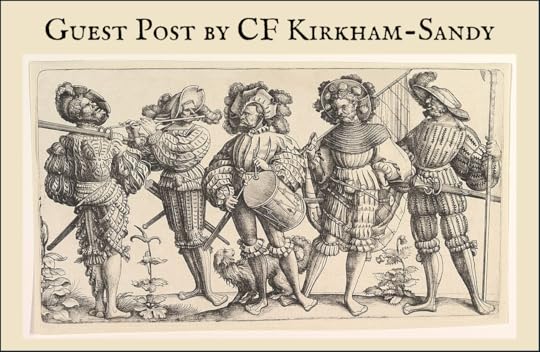 When it comes to historical accuracy, Hollywood is a mixed bag. If Hollywood is to be believed, medieval warfare lasted from 300 to 1700 AD and mostly took place in foggy forests and swamps. Men in dirty armour and woollen chainmail fought one-on-one, having forgotten to put on their helmets or their tabards. They hacked each other to death with swords, axes, maybe crossbows, and it never occurred to them that maybe they could use some gunpowder, or that a formation of some kind would protect them. No doubt they left their brains at home, next to the helmet and the tabard.
When it comes to historical accuracy, Hollywood is a mixed bag. If Hollywood is to be believed, medieval warfare lasted from 300 to 1700 AD and mostly took place in foggy forests and swamps. Men in dirty armour and woollen chainmail fought one-on-one, having forgotten to put on their helmets or their tabards. They hacked each other to death with swords, axes, maybe crossbows, and it never occurred to them that maybe they could use some gunpowder, or that a formation of some kind would protect them. No doubt they left their brains at home, next to the helmet and the tabard.
This is a shame, as the world of the landsknecht was as colourful as it was dangerous, and a good formation is very satisfying to watch. What would a movie about Roman legionaries be, without the classic tortoise formation?

Landsknecht with his wife, engraved by Daniel Hopfer
The word landsknecht (‘servant of the land’) first appears in 1486. Maximilian I had realised that his armies’ organisation and tactics were ineffective, so he cribbed from the Swiss. He recruited pikemen from his territories in South Germany and gave them new training under a Swiss captain. The result was two new regiments, totalling six to eight thousand men.
Unfortunately for Maxmilian and his successors, the landsknechts took something else from the Swiss: the right to choose their own employer, and the right to recruit others to serve that employer. They based this right on ancient customs.
Unlike France and England, Italy and Germany were far from centralised. Italy was a mixture of duchies, republics and principalities. Germany’s political map – a complex mosaic that is almost tiring to look at – makes Italy’s look stable and straightforward in comparison. National identities are fluid, tenuous things, and in the modern day we take it for granted that a nation is represented on a map by a state. Germany and Italy were ideas, names given to regions. We think of Erasmus as Dutch, but at the time he was called ‘the German Socrates’.
Each tiny piece of that German mosaic represents a different prince with his own ambitions, ideas, and beliefs. The more princes there are, the harder it becomes to enforce religious unity. When threatened, religious dissidents can simply hop the border and enter the jurisdiction of a different duke. Alone, a duke might have difficulty defying the emperor, but the German states knew there was strength in numbers, forming alliances like the Schmalkaldic League.
The prince-employer bought his landsknechts in units called standards (or ensigns). He would then choose a colonel from among the landsknechts and give him letters patent – orders to recruit a fixed number of troops. The colonel needed permission from local magnates to recruit in their territory – but in a region as divided as Germany, that was not hard to obtain.

Etching by Daniel Hopfer
Each company had a captain, so the captains roamed the area, equipped with fifes, drums, and commission papers. If a willing recruit looked suitable, his details were written down on the muster roll: name, age, birthplace, and primary weapon. The recruit would be given the location of the company’s place of assembly and told when he needed to be there to muster.
The captain would choose an open space as the place of assembly. Then he would stick two halberds upright in the ground and lay a pike across them, making a rectangular doorway. When the recruits arrived, they would form ranks behind this rectangle. One by one, they would step through the doorway, a bit like going through the metal detector at the airport. The men and their weapons would be examined, to see if both were in good working order. From this process we get the phrase ‘to pass muster’. Once the muster was complete, everyone formed a circle around the colonel and he read aloud a letter of articles: the terms and conditions.
Captains could be confident they would find enough willing recruits. The sixteenth century was a time of economic hardship. Depopulation caused by the Black Death had improved the bargaining power of labourers in the later medieval period. By the sixteenth century the population was back up, and so now labour was plentiful instead of scarce. That meant high unemployment and a fall in living standards, because those with work saw their stagnant income eroded by inflation.
A pikeman could expect around 3 ducats a month, but skilled warriors could bargain for more. Fighting on the front line came with the highest risk and the highest reward: the men in the front lines were doppelsoldner, or double-pay-men. If your name was entered on the muster roll, you got conduct money to cover the cost of travelling to the place of assembly. Captains could also earn a little extra by cheating: they were paid for each name, so some of the men on the muster rolls didn’t exist. Having a muster at a place of assembly helped to counteract this: if men didn’t turn up, they would have to be struck off the roll.
The structure of Italian society made long-term recruitment of troops more difficult than in other countries. They tended to employ mercenaries instead of being them. Famously, Machiavelli loathed mercenaries. He had learned the hard way that mercenaries can desert at a critical moment. He argued that a prince could still use mercenaries effectively, but only to invade another prince’s territory – never to defend his own. A prince should put his territory’s defence in the hands of his citizens. They could be relied upon when the battle got desperate – because they would be fighting for the security of their homes, their families, their churches, their crops.
But mercenaries still demanded discipline and internal order in their companies. After the colonel had read the letter of articles, landsknechts sealed their service with oaths. Standard-bearers had an additional oath to defend the company’s standards at all costs.
There was a hierarchy within an army of landsknechts. At the top was the colonel, answering to the prince-employer. Answering to the colonel was the lieutenant-colonel, and the captains answered to the lieutenant-colonel. Each company had a quartermaster called a harbinger and a surgeon. Surgeons were highly skilled at operating – they could amputate a leg in under a minute – but infection was a major killer. The provost oversaw discipline, and he brought troublemakers before the Justizamptmann – the bailiff. (Also known as a Schultheiss.) The bailiff enforced martial law. He selected the jury and the court martial officers. If the jury found the accused guilty, the bailiff sentenced him.
Landsknechts were not exempt from the rules of war. Priests, women, and churches must be spared – and if you were inside a church, you were forbidden from selling alcohol when the priest was holding a service. Gambling and drunkenness were also forbidden, to prevent fights from breaking out among the ranks. Landsknechts were not permitted to continue feuds in the name of their personal honour.
Under the stress of supply problems, order crumbled. It was not easy to keep landsknechts well fed and well-paid. Mills were a vital piece of infrastructure, the places where grain could be turned into flour, but rampaging armies targeted them in order to starve the enemy. In 1527, unpaid mercenaries mutinied and sacked Rome – shaming their employer, Emperor Charles V. To add insult to injury, the landsknechts scrawled LUTHER on the frescoes of the papal palace.
Despite their reputation for unreliability, cowardice and desertion carried the death penalty. Of course, in the heat of battle, there was no time for a court martial, so panicking deserters were killed by their fellow soldiers. Before battle, some landsknechts had a ritual to purify themselves: they threw mud over their shoulder, rather like the superstition of throwing salt over the shoulder today.
Each landsknecht had to own his own weapons: no sharing, no borrowing. Armour and weapons could be decorated with religious symbols or erotic imagery. Weapons made beautiful gifts: Erasmus was a total civilian, but he owned a long dagger called a baselard, the scabbard decorated with a design by Holbein.

Battle Scene – After Hans Holbein the Younger.
Each landsknecht had a sword for his secondary weapon. For his primary weapon, he would have a pike, a zweihander, a halberd, or an arquebus. Most landsknechts were pikemen. The pike was eighteen feet of ash tipped with a steel spearhead, so it allowed the pikeman to hold off his enemy at some distance. Pikemen were effective against infantry and essential for breaking cavalry charges. Welsh pikemen helped put Henry VII on the throne in 1485.
Landsknechts used a square formation called gevierte Ordnung (fourth order). A formation could include up to ten thousand men. Usually, landsknechts drew up in three squares, called igels – igel means hedgehog. Each of the four sides of the square had three outward-facing rows of pikemen.
If pikes weren’t enough to hold back the enemy cavalry, halberdiers with their billhooks could come to the aid of the pikemen. A halberd is a three-in-one spear, axe and billhook, usually around eight feet long. If the horse reached within eighteen feet- past the pike points- the billhook could be used to unseat the rider. Landsknechts with zweihanders could also protect pikemen: the weight and length of zweihanders meant they could be swung around to knock aside the weapons of the enemy. According to the Burgundian chronicler Jean Molinet, it was a halberd that killed Richard III. Given the versatile nature of the weapon, the different wounds on Richard’s skull could have been made by halberds.
Arquebuses (also known as hackbuts) could cut down cavalry with their fire, but loading and firing an arquebus is a slow and fiddly business demanding both hands. An arquebusier preparing his weapon for the next shot is vulnerable. So, pikemen and arquebusiers worked well together. The arquebusier takes down the horse before he can reach the pikeman, and the pikeman guards the arquebusier from attack.
Landsknechts didn’t have formal uniforms, but their colourful clothes are distinctive. The troops of Giovanni de Medici wore mourning sashes permanently after his death, and the colour contrast would have been striking. Landsknechts could go up to a month without changing these clothes, as there wasn’t much by way of laundry facilities for an army on the move. This isn’t quite as awful as it sounds: early modern clothes were made from linen and wool and were far more breathable than modern synthetic fabrics. Over the top, thick leather coats could protect the landsknecht from cuts and slashes.
And perhaps, those huge feathers in his hat brought him a little cheer as he rode off to war.
Further reading:
The King’s Painter: The Life and Times of Hans Holbein by Franny Moyle
The Beauty and the Terror: An Alternative History of the Italian Renaissance by Catherine Fletcher
“The Landsknecht: His Recruitment and Organization, With Some Reference to the Reign of Henry VIII.” Military Affairs, vol. 35, no. 3 (1971) pp. 95–99, by John Gilbert Miller.
CF Kirkham-Sandy is the author of the Tudor novel Shackled to a Ghost, now available on Amazon US, Amazon UK and Kindle Unlimited (search on Amazon using code B0DV5F6585).
CF Kirkham-Sandy grew up in Devon and has a BA and an MA in History from the universities of York and Bristol. CF lives and works in Herefordshire, and moonlights as a history tutor for students of all ages. CF is currently writing another novel and can be found on Threads @kirkhamsandycf and Twitter @Catofthepigeons.
The post 16th Century ‘Landsknechts’ appeared first on Jonathan Posner.
Guest Post – 16th Century ‘Landsknechts’ (German mercenaries)
 When it comes to historical accuracy, Hollywood is a mixed bag. If Hollywood is to be believed, medieval warfare lasted from 300 to 1700 AD and mostly took place in foggy forests and swamps. Men in dirty armour and woollen chainmail fought one-on-one, having forgotten to put on their helmets or their tabards. They hacked each other to death with swords, axes, maybe crossbows, and it never occurred to them that maybe they could use some gunpowder, or that a formation of some kind would protect them. No doubt they left their brains at home, next to the helmet and the tabard.
When it comes to historical accuracy, Hollywood is a mixed bag. If Hollywood is to be believed, medieval warfare lasted from 300 to 1700 AD and mostly took place in foggy forests and swamps. Men in dirty armour and woollen chainmail fought one-on-one, having forgotten to put on their helmets or their tabards. They hacked each other to death with swords, axes, maybe crossbows, and it never occurred to them that maybe they could use some gunpowder, or that a formation of some kind would protect them. No doubt they left their brains at home, next to the helmet and the tabard.
This is a shame, as the world of the landsknecht was as colourful as it was dangerous, and a good formation is very satisfying to watch. What would a movie about Roman legionaries be, without the classic tortoise formation?

Landsknecht with his wife, engraved by Daniel Hopfer
The word landsknecht (‘servant of the land’) first appears in 1486. Maximilian I had realised that his armies’ organisation and tactics were ineffective, so he cribbed from the Swiss. He recruited pikemen from his territories in South Germany and gave them new training under a Swiss captain. The result was two new regiments, totalling six to eight thousand men.
Unfortunately for Maxmilian and his successors, the landsknechts took something else from the Swiss: the right to choose their own employer, and the right to recruit others to serve that employer. They based this right on ancient customs.
Unlike France and England, Italy and Germany were far from centralised. Italy was a mixture of duchies, republics and principalities. Germany’s political map – a complex mosaic that is almost tiring to look at – makes Italy’s look stable and straightforward in comparison. National identities are fluid, tenuous things, and in the modern day we take it for granted that a nation is represented on a map by a state. Germany and Italy were ideas, names given to regions. We think of Erasmus as Dutch, but at the time he was called ‘the German Socrates’.
Each tiny piece of that German mosaic represents a different prince with his own ambitions, ideas, and beliefs. The more princes there are, the harder it becomes to enforce religious unity. When threatened, religious dissidents can simply hop the border and enter the jurisdiction of a different duke. Alone, a duke might have difficulty defying the emperor, but the German states knew there was strength in numbers, forming alliances like the Schmalkaldic League.
The prince-employer bought his landsknechts in units called standards (or ensigns). He would then choose a colonel from among the landsknechts and give him letters patent – orders to recruit a fixed number of troops. The colonel needed permission from local magnates to recruit in their territory – but in a region as divided as Germany, that was not hard to obtain.

Etching by Daniel Hopfer
Each company had a captain, so the captains roamed the area, equipped with fifes, drums, and commission papers. If a willing recruit looked suitable, his details were written down on the muster roll: name, age, birthplace, and primary weapon. The recruit would be given the location of the company’s place of assembly and told when he needed to be there to muster.
The captain would choose an open space as the place of assembly. Then he would stick two halberds upright in the ground and lay a pike across them, making a rectangular doorway. When the recruits arrived, they would form ranks behind this rectangle. One by one, they would step through the doorway, a bit like going through the metal detector at the airport. The men and their weapons would be examined, to see if both were in good working order. From this process we get the phrase ‘to pass muster’. Once the muster was complete, everyone formed a circle around the colonel and he read aloud a letter of articles: the terms and conditions.
Captains could be confident they would find enough willing recruits. The sixteenth century was a time of economic hardship. Depopulation caused by the Black Death had improved the bargaining power of labourers in the later medieval period. By the sixteenth century the population was back up, and so now labour was plentiful instead of scarce. That meant high unemployment and a fall in living standards, because those with work saw their stagnant income eroded by inflation.
A pikeman could expect around 3 ducats a month, but skilled warriors could bargain for more. Fighting on the front line came with the highest risk and the highest reward: the men in the front lines were doppelsoldner, or double-pay-men. If your name was entered on the muster roll, you got conduct money to cover the cost of travelling to the place of assembly. Captains could also earn a little extra by cheating: they were paid for each name, so some of the men on the muster rolls didn’t exist. Having a muster at a place of assembly helped to counteract this: if men didn’t turn up, they would have to be struck off the roll.
The structure of Italian society made long-term recruitment of troops more difficult than in other countries. They tended to employ mercenaries instead of being them. Famously, Machiavelli loathed mercenaries. He had learned the hard way that mercenaries can desert at a critical moment. He argued that a prince could still use mercenaries effectively, but only to invade another prince’s territory – never to defend his own. A prince should put his territory’s defence in the hands of his citizens. They could be relied upon when the battle got desperate – because they would be fighting for the security of their homes, their families, their churches, their crops.
But mercenaries still demanded discipline and internal order in their companies. After the colonel had read the letter of articles, landsknechts sealed their service with oaths. Standard-bearers had an additional oath to defend the company’s standards at all costs.
There was a hierarchy within an army of landsknechts. At the top was the colonel, answering to the prince-employer. Answering to the colonel was the lieutenant-colonel, and the captains answered to the lieutenant-colonel. Each company had a quartermaster called a harbinger and a surgeon. Surgeons were highly skilled at operating – they could amputate a leg in under a minute – but infection was a major killer. The provost oversaw discipline, and he brought troublemakers before the Justizamptmann – the bailiff. (Also known as a Schultheiss.) The bailiff enforced martial law. He selected the jury and the court martial officers. If the jury found the accused guilty, the bailiff sentenced him.
Landsknechts were not exempt from the rules of war. Priests, women, and churches must be spared – and if you were inside a church, you were forbidden from selling alcohol when the priest was holding a service. Gambling and drunkenness were also forbidden, to prevent fights from breaking out among the ranks. Landsknechts were not permitted to continue feuds in the name of their personal honour.
Under the stress of supply problems, order crumbled. It was not easy to keep landsknechts well fed and well-paid. Mills were a vital piece of infrastructure, the places where grain could be turned into flour, but rampaging armies targeted them in order to starve the enemy. In 1527, unpaid mercenaries mutinied and sacked Rome – shaming their employer, Emperor Charles V. To add insult to injury, the landsknechts scrawled LUTHER on the frescoes of the papal palace.
Despite their reputation for unreliability, cowardice and desertion carried the death penalty. Of course, in the heat of battle, there was no time for a court martial, so panicking deserters were killed by their fellow soldiers. Before battle, some landsknechts had a ritual to purify themselves: they threw mud over their shoulder, rather like the superstition of throwing salt over the shoulder today.
Each landsknecht had to own his own weapons: no sharing, no borrowing. Armour and weapons could be decorated with religious symbols or erotic imagery. Weapons made beautiful gifts: Erasmus was a total civilian, but he owned a long dagger called a baselard, the scabbard decorated with a design by Holbein.

Battle Scene – After Hans Holbein the Younger.
Each landsknecht had a sword for his secondary weapon. For his primary weapon, he would have a pike, a zweihander, a halberd, or an arquebus. Most landsknechts were pikemen. The pike was eighteen feet of ash tipped with a steel spearhead, so it allowed the pikeman to hold off his enemy at some distance. Pikemen were effective against infantry and essential for breaking cavalry charges. Welsh pikemen helped put Henry VII on the throne in 1485.
Landsknechts used a square formation called gevierte Ordnung (fourth order). A formation could include up to ten thousand men. Usually, landsknechts drew up in three squares, called igels – igel means hedgehog. Each of the four sides of the square had three outward-facing rows of pikemen.
If pikes weren’t enough to hold back the enemy cavalry, halberdiers with their billhooks could come to the aid of the pikemen. A halberd is a three-in-one spear, axe and billhook, usually around eight feet long. If the horse reached within eighteen feet- past the pike points- the billhook could be used to unseat the rider. Landsknechts with zweihanders could also protect pikemen: the weight and length of zweihanders meant they could be swung around to knock aside the weapons of the enemy. According to the Burgundian chronicler Jean Molinet, it was a halberd that killed Richard III. Given the versatile nature of the weapon, the different wounds on Richard’s skull could have been made by halberds.
Arquebuses (also known as hackbuts) could cut down cavalry with their fire, but loading and firing an arquebus is a slow and fiddly business demanding both hands. An arquebusier preparing his weapon for the next shot is vulnerable. So, pikemen and arquebusiers worked well together. The arquebusier takes down the horse before he can reach the pikeman, and the pikeman guards the arquebusier from attack.
Landsknechts didn’t have formal uniforms, but their colourful clothes are distinctive. The troops of Giovanni de Medici wore mourning sashes permanently after his death, and the colour contrast would have been striking. Landsknechts could go up to a month without changing these clothes, as there wasn’t much by way of laundry facilities for an army on the move. This isn’t quite as awful as it sounds: early modern clothes were made from linen and wool and were far more breathable than modern synthetic fabrics. Over the top, thick leather coats could protect the landsknecht from cuts and slashes.
And perhaps, those huge feathers in his hat brought him a little cheer as he rode off to war.
Further reading:
The King’s Painter: The Life and Times of Hans Holbein by Franny Moyle
The Beauty and the Terror: An Alternative History of the Italian Renaissance by Catherine Fletcher
“The Landsknecht: His Recruitment and Organization, With Some Reference to the Reign of Henry VIII.” Military Affairs, vol. 35, no. 3 (1971) pp. 95–99, by John Gilbert Miller.
CF Kirkham-Sandy is the author of the Tudor novel Shackled to a Ghost, now available on Amazon US, Amazon UK and Kindle Unlimited (search on Amazon using code B0DV5F6585).
CF Kirkham-Sandy grew up in Devon and has a BA and an MA in History from the universities of York and Bristol. CF lives and works in Herefordshire, and moonlights as a history tutor for students of all ages. CF is currently writing another novel and can be found on Threads @kirkhamsandycf and Twitter @Catofthepigeons.
The post Guest Post – 16th Century ‘Landsknechts’ (German mercenaries) appeared first on Jonathan Posner.






